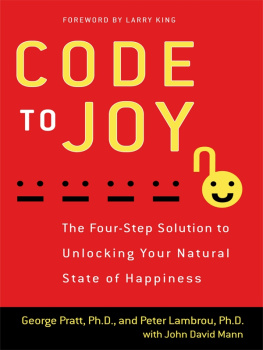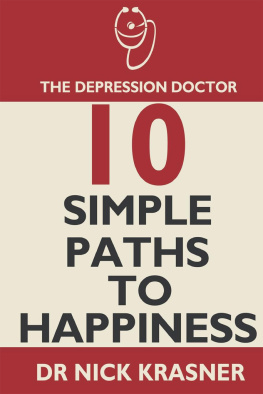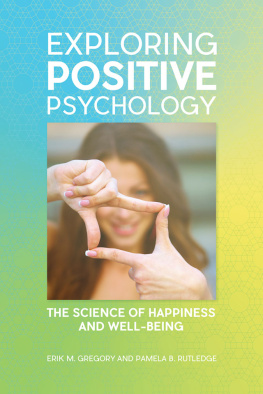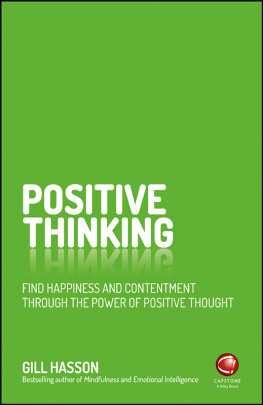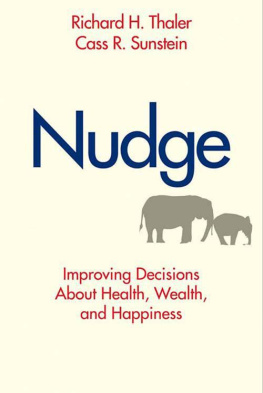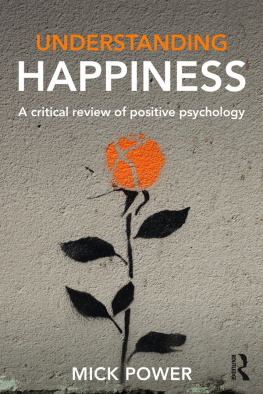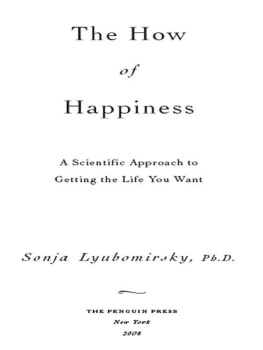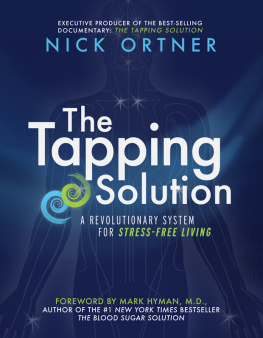THE TWENTIETH CENTURY HAD its share of medical miracles. I should know. When youve survived a heart attack, had quintuple bypass surgery, and youre still going strong a quarter-century later, it gives you a pretty healthy appreciation for modern medicine.
Still, there are some aspects of the human condition medicine cant touch. Or at least it couldnt until now. Modern medicine has made us a lot healthierbut what about happier ? That may be where the frontier of medicine lies in this still young century. And one of the undisputed masters of that new frontier is a clinical psychologist named George Pratt.
The first time I met Dr. Pratt he was a guest on Larry King Live, talking about a fascinating approach to healing our emotions and creating lasting improvements in our productivity and sense of fulfillment.
Whether its an unresolved hurt, persistent low self-esteem, or vague sense of anxious unease, said Dr. Pratt, most of us struggle with some version of what we call the fog of distress . It clouds our lives, interfering with our relationships, our careers, even our health. And no matter how many hours you spend on the couch, talking it through just doesnt always do it.
Why not?
Because theres typically a disconnect, he explained, between what we logically know about ourselves and the place in the brain where our emotions live. Sometimes you just cant get there from here. You have to find alternative ways to get that information to click.
Alternative ways like what? Like energy psychology .
If youve never heard the term before, youre not alone. Neither had I, before that show. But in the years to come, you and I will be hearing about it plenty. It refers to innovative techniques that affect the bodys energy systems, almost like a 60,000-mile tune-up of the thoughts and emotions. Using these techniques, as my distinguished guest explained it, you can clear out the past traumas and events that created those disconnects in the first place. The result? Its something like what happens when a fresh wind blows away the clouds: the sun comes out .
Actually, he added, its a pretty easy thing to do. And it works.
Dr. Pratt has helped pro golfers and ballplayers improve their game, jilted young men and women get over heartbreak, estranged couples get their groove back. He has helped people get past the trauma of terrible accidents, restart faltering careers, recover lost self-confidence, and move past irrational fears.
He has even helped one talk show host I knowme.
Even before we had him on the show that first time, I knew a little bit about the good doctor. He had worked with two people on the Larry King Live staff, and they had gotten fabulous results from those sessions. Soon I had him on as a guest again, and this time he talked about creating your own joy.
Now I was really intrigued.
We set up a time when he could give me a private demonstration of the approach youre about to explore in this book. So wed have something to work with, I described an emotional issue in my own life. What he did with it in the fifteen minutes we spent together blew my mind. To say it was impressive would be a crime of understatement. It was remarkable . When he says its a simple and easy process, hes not kidding. When he says it works, hes not kidding there either.
George Pratt is a true modern-day healer, and what he and his colleague, Dr. Peter Lambrou, have created in the pages youre about to read is a brilliant formula for tapping into our highest potential. I predict it will change many peoples lives for the better.
Including yours.
Whatever is going on in your life, whatever is keeping you from being as successful, as productive, as flat-out joyful as youd like to be, theres a path that will take you there. I know, because Ive experienced it firsthand.
Larry King
Stefanies Question
Something is not right.
Miss Clavel, in the middle of the night, in Madeline
A FEW YEARS AGO a woman named Stefanie came to our office seeking treatment. In the course of our first visit, she asked us a question she had been trying to answer for decades. Its a question millions of people have asked throughout history. Maybe you have asked it yourself.
Stefanies history, we soon learned, was a rags-to-riches success story. Growing up in a poor family, she took a job in her teens as an office assistant for an advertising company. Working her way up through the ranks, she eventually reached the top, so that by her mid-forties she had become CEO and majority owner of the firm. Stefanie also had a rich personal life. A kind and generous woman, she was active in the community where she lived with her husband, proud parents of two healthy, thriving kids.
In fact, Stefanie appeared to have been living a charmed life in every wayexcept for one thing: she was deeply unhappy.
Stefanies unhappiness was practically tangible. When she entered the room, it was as if a dark cloud entered with her. As she began describing her situation, it became clear that this dark cloud followed her into every corner of her life.
By all accounts she was a great mother, but she didnt feel like a great mother. She also felt deeply guilty about the collapse of a previous marriage many years earlier, and that guilt hovered over her like the gloom of an overcast sky. Her health was affected, too: now in her fifties, Stefanie was having severe stomach and digestive problems and had recently undergone back surgery for a bad disc. Despite all her successes, that dark cloud had also cast its shadow over her professional world. After a series of management mishaps, Stefanies advertising company had recently slipped into bankruptcy.
For no apparent reason, Stefanies life was unraveling.
Ive seen psychiatrists here in California, she said, and in New York, and in London. Ive been on every antidepressant. Ive read all the books and articles about mood issues. Ive read everything and tried everything, but that unhappiness still persistsand I dont know why. Everyone tells me I have nothing to complain about and everything to be grateful for. And I know theyre right. But knowing that doesnt make it better.
And then Stefanie asked The Question:
Why arent I happy?
Over the course of our sixty years of combined clinical practice, we have heard thousands of variations of Stefanies question, from thousands of people:
Why am I anxious? nervous? insecure? always worried? Why cant I seem to find or sustain a fulfilling relationship? find work I enjoy? relax when I am at home with my family? Why do I have this irrational fear of crowdsof menof womenof elevatorsof foodof closed spacesof open spacesof being aloneof being with others? Why cant I get over that breakup? my compulsive behavior? my challenges with money? my feeling that Im a fraud?
In a million different versions, Stefanies question echoes throughout our society and within virtually everyone we know. You probably have your own version.
We are the healthiest, best nourished, and longest-living generation in history. By all rights, we ought to be the happiest, most purposeful, productive, and fulfilled generation in history, too. But for some reason, were not.
Why not?
Its a puzzle weve been pursuing for decadesand the answer turns out to have something to do with how water turns into fog.
IMAGINE YOU ARE STANDING just outside your home, surrounded by a dense fog, so thick you cant see the other side of the street in front of you. You look to the right, then to the left, but you cannot see more than fifty feet in any direction. You are surrounded.
How much water do you suppose it takes to create that blanket of fog that has completely isolated you from your world?
Before you read on, think about this for a moment. Dont worry if youre not good at math or have no background in physics. Just take a commonsense guess. How much water do you think it took to create this fog that surrounds you?

